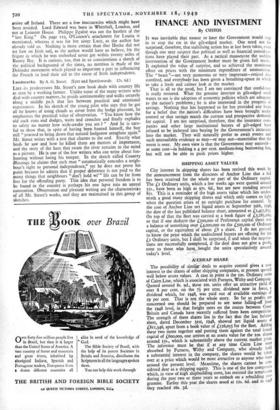FINANCE AND INVESTMENT
By CUSTOS
IT was inevitable that sooner or later the Government would step in to stop the rot in the gilt-edged market. One need not be surprised, therefore, that stabilising action has at last been taken, even though one may suspect that political as well as financial considera- tions have played their part. As a tactical manoeuvre the sudden intervention of the Government broker must be given full marks. It exploited the value of surprise, and so achieved the maximum effect on prices with the minimum expenditure of ammunition. The " bears "—not very numerous or very important—retired dis- comfited, and everybody has been given a breathing-space in whizh to take a fresh and calmer look at the market.
That is all to the good, but I am not convinced that confidence is really restored. What the genuine investor in gilt-edged stock wants to see is the adoption of economic policies which are adequate to the nation's problems ; he is also interested in the progress of savings. Nothing that has happened so far has provided any basis for a belief that the nation's difficulties have been brought under control or that savings match the current and prospective demands for capital. I am not surprised, therefore, that the insurance com- panies and other large institutional buyers of gilt-edged have refused to be jockeyed into buying by the Government's incursion into the market. They will naturally prefer to await events and such unassailable evidence as may—or may not—materialise that the worst is over. My own view is that the Government may succeed— at some cost—in holding a 4 per cent. medium-long borrowing line, but will not be able to push prices higher.
SHIPPING ASSET VALUES
City interest in shipping shares has been revived this week by the announcement from the directors of Anchor Line that a bid has been received for the whole or part of the Ordinary capital. The LI Ordinary units, which a few weeks ago were quoted around 55s., have been as high as 97s. 6d., but are now standing around 85s. This is a reminder of the high assets value which lies under- neath a good many shipping shares and which only comes to light when the question arises of an outright purchase for control. In the case of Anchor Line net liquid assets at September 3oth, 1948, the date of the last published balance sheet, amounted to £1,425,835. On top of that the fleet was carried at a book figure of £3,285,000, so that if one deducts the £5oo,000 of Preference capital there was a balance of something over &mope* on the £500,00o of Ordinary capital, or the equivalent of about £8 a share. I do not pretend to know the price which the undisclosed buyers are offering for the Li Ordinary units, but I shall be surprised, if and when the negotia- tions are successfully completed, if the deal does not give a profit, even to those who have, bought the units speculatively around today's level.
Al CHEAP SHARE The possibility of similar deals to acquire control gives a new interest to the shares of other shipping companies, at present quoted well below assets values. A case in point is the tos. Ordinary units of Cairn Line, which is associated with Furness, Withy and Company. Quoted around 8s. 9d., these los. units offer an attractive yield of over S per cent. on ;he 71 per cent. dividend now in force, a dividend which, for 1948, was paid out of available earnings of 29 per cent. That is not the whole story. So far as profits are concerned one should be prepared to see some falling-off from the 1948 level, in that freight rates on the routes between Great Britain and Canada have recently suffered from keen competition. The strength of these shares lies in the fact that the last balance sheet, dated December 31st, 1948, showed net liquid assets of £811,546, apart from a book value of £126,055 for the fleet. Adding these two items together and putting them against the total issued capital of £600,000, one arrives at an assets value for the ros. shares around 15s., which is substantially above the current market price. The inference must be that if at any time Cairn Line were absorbed by Furness, Withy and Company, who already hold a substantial interest in the company, the shares would be taken over at a price which would be most attractive to anyone who buys around the present level. Meantime, the shares cannot be con- sidered dear as a shipping equity. This is one of the few companies which, in view of high shipbuilding costs; has resisted the temptation during the past two or three years to embark on a rebuilding pro- gramme. Earlier this year the shares stood at 12S. 6d. and in 194g they reached tills. 3d.














































































 Previous page
Previous page